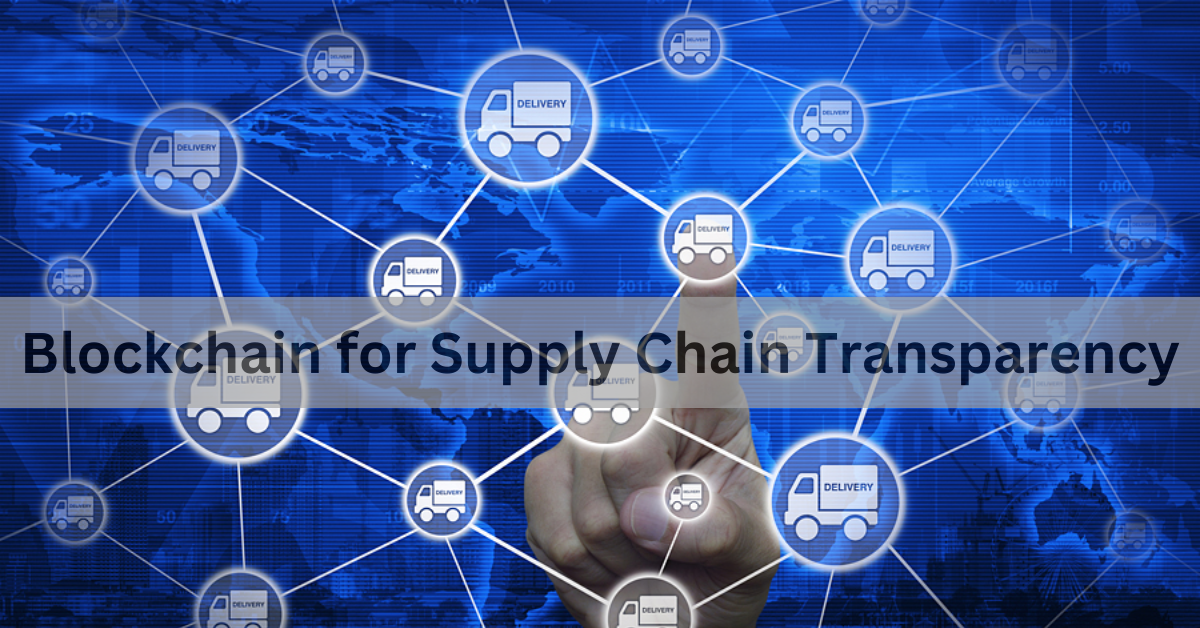Contents
- 1 Introduction to Blockchain in Supply Chain
- 2 Understanding Blockchain Technology
- 3 Importance of Supply Chain Transparency
- 4 Benefits of Blockchain in Supply Chain Transparency
- 5 Real-World Applications of Blockchain in Supply Chain
- 6 Challenges in Implementing Blockchain for Supply Chain
- 7 The Future of Blockchain in Supply Chain
- 8 Conclusion
Introduction to Blockchain in Supply Chain
In today’s interconnected global economy, supply chain transparency is crucial for ensuring efficiency, trust, and accountability. Blockchain technology, initially developed for cryptocurrencies like Bitcoin, has emerged as a powerful tool for revolutionizing supply chain management. By providing a decentralized, immutable ledger, blockchain enhances visibility and traceability throughout the supply chain. This article explores the significance, benefits, implementation challenges, and future prospects of using blockchain for supply chain transparency.
Understanding Blockchain Technology
Blockchain is a distributed ledger technology that records transactions across multiple computers in a way that ensures security, transparency, and immutability. Each transaction, or “block,” is linked to the previous one, forming a “chain” of records that cannot be altered retroactively. This technology is highly secure and transparent, making it ideal for applications requiring high levels of trust and traceability.
Importance of Supply Chain Transparency
Supply chain transparency involves tracking and documenting all aspects of a product’s journey from raw material to final consumer. Transparent supply chains offer numerous benefits:
- Consumer Trust: Increased transparency builds consumer confidence in the authenticity and quality of products.
- Efficiency: Real-time tracking reduces delays and improves overall efficiency.
- Compliance: Transparent supply chains help companies meet regulatory requirements.
- Sustainability: Enables tracking of environmental and social impact, promoting sustainable practices.
Benefits of Blockchain in Supply Chain Transparency
Blockchain technology offers several key advantages for enhancing supply chain transparency:
- Immutability: Once recorded, transactions cannot be altered, ensuring data integrity.
- Traceability: Provides a permanent record of every transaction, enabling complete traceability of products.
- Decentralization: Eliminates the need for a central authority, reducing the risk of fraud and manipulation.
- Automation: Smart contracts automate processes, reducing manual intervention and errors.
- Cost Reduction: Streamlines operations and reduces administrative costs by eliminating intermediaries.
Real-World Applications of Blockchain in Supply Chain
Several industries are already leveraging blockchain to enhance supply chain transparency:
- Food and Beverage: Companies like Walmart and IBM are using blockchain to track food products from farm to table, ensuring safety and authenticity.
- Pharmaceuticals: Blockchain helps track the origin and movement of drugs, combating counterfeit products and ensuring compliance.
- Fashion and Luxury Goods: Brands like Louis Vuitton and De Beers use blockchain to verify the authenticity of their products and ensure ethical sourcing.
- Automotive: Blockchain enables tracking of parts and materials, improving quality control and recall management.
Challenges in Implementing Blockchain for Supply Chain
Despite its benefits, implementing blockchain in supply chains comes with challenges:
- Integration: Integrating blockchain with existing systems can be complex and costly.
- Scalability: Managing large volumes of transactions on blockchain networks can be challenging.
- Data Privacy: Ensuring data privacy while maintaining transparency can be difficult.
- Adoption: Convincing all stakeholders to adopt and trust the new technology requires significant effort.
The Future of Blockchain in Supply Chain
The future of blockchain in supply chains looks promising, with several trends and developments on the horizon:
- Interoperability: Improved interoperability between different blockchain platforms will enhance collaboration and data sharing.
- Regulatory Support: Increased regulatory support and standardization will drive broader adoption.
- Enhanced Security: Advances in cryptographic techniques will further improve security and privacy.
- AI Integration: Combining blockchain with AI will enable predictive analytics and more efficient supply chain management.
- Sustainability: Blockchain will play a crucial role in promoting sustainable and ethical supply chains by providing verifiable data on environmental and social impact.
Conclusion
Blockchain technology is transforming supply chain management by enhancing transparency, traceability, and trust. While challenges remain, the potential benefits far outweigh the hurdles. As the technology evolves and matures, it will become an integral part of supply chain operations across various industries. Embracing blockchain for supply chain transparency can lead to more efficient, trustworthy, and sustainable supply chains, ultimately benefiting businesses, consumers, and the planet.


